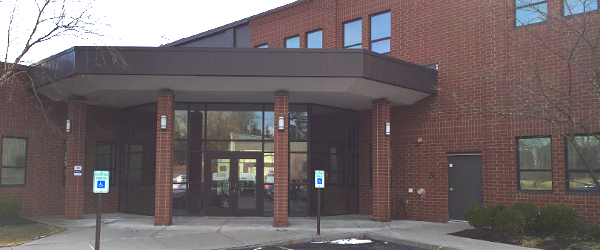- By Dan Veaner
- Around Town
 Print
Print 
The Alcohol & Drug Council of Tompkins County announced last February that it had secured a site on North Triphammer Road that will be the first in Tompkins County to provide open access addiction treatment services, eventually including a 40-bed medically supervised detox and stabilization unit. On hearing about the plan, some neighbors in the Village of Lansing approached the Village trustees with fears about the proximity of a detox facility to their homes. But Alcohol & Drug Council officials say they have been and will continue to be transparent about their plans, and the fears neighbors have expressed may be based on stereotypes.
"I think there is a lot of mis-perception around what that looks like and what that is," says Executive Director Angela Sullivan. "Hollywood hasn't helped us in some ways. How medically supervised withdrawal and stabilization work is that it is for people with mild to moderate diagnoses of addiction. People who have serious diagnoses and other complicating medical factors still need hospital-based detox. I think when people think detox, they thing that hospital-based detox model. This is a community-based detox model. That involves a shorter stay in the detox facility. They receive counseling, connections to resources, and once they become stable they are counseled on employment, education, and other supports and alternative activities to those that they were doing when they came in."
The 19,420 square foot building near the corner of Triphammer and graham Roads, is already open for business, expanding the 'open access' program from the Council's Ithaca location on Green Street to provide weekend hours. The program allows people in need to come in for referrals and services, and by partnering with other local agencies that will send representatives to the Drug & Alcohol Council facilities, they become a one-stop-shop for people in need of help with their addictions. This expansion means that 'open access' services are available every day, including Saturday and Sunday from 10am to 6pm.
The Drug & Alcohol Council was founded in 1965, and was in various locations including the basement of a church and above The Chanticleer bar on the corner of State and Cayuga Streets before finding a home on Green Street in 1990. The Triphammer Road location allowed the program to expand to new levels, including expanding the current outpatient services.
In the relatively near future the plan is to expand even further. New York State approached the Alcohol & Drug Council a few years ago about opening a detox facility. The expansion will include making Open access services available 24 hours every day, plus converting the second floor of the Triphammer building into a 40-bed detox center. It will be the only such facility in this area, with the closest facilities at least an hour's drive from here. Sullivan says hospitals used to provide detox services, but haven't done so for a number of years.
"We're filling a gap in the continuum of care," Sullivan says. "There has not been any official detox services in Tompkins County for close to 20 years. People have been forced to seek those services out of town or out of the community, or they've gone to emergency rooms or jails to address their addiction issue."
Neighbors told Village of Lansing Trustees that they were worried that addicts would be wandering around their neighborhood, making the neighborhood unsafe and possibly impacting property values. But Drug & Alcohol Council officials say that patients who check into the detox clinic will be inside the building most of the time, and if they go outside, for example, to have lunch at the picnic area, they will be supervised.
Another neighborhood concern was that patients would move into a nearby apartment complex that they said already has problems. But Director of Development Emily Parker says that it wouldn't make sense to just dump patients moving to the next step in their recovery in a location just because it is near by.
"We're not going to help them find a place across the street from here when that doesn't make sense," she says. "We're not looking just to house close. We're looking to house in the most appropriate way for that person. And many people would go from here into an extended rehabilitation center like CARS (Cayuga Addiction Recovery Services in Trumansburg)."
In its effort to be transparent about its plans, the Council has been meeting with Village officials and many other agencies, giving tours to law enforcement officials, local judges, service providers, Cayuga Medical Center Staff, and ambulance providers. Congressman Tom Reed took a tour Tuesday.
"Addiction has swept across our area, our state, and our country, taking far too many lives and destroying others in its wake," Reed said "We are encouraged by the work the Alcohol & Drug Council is doing to combat addiction and support those who are addicted as well as their friends and family. We care about people who are impacted by addiction and The Open Access Center demonstrates that with fair access to treatment options, we can make a difference together."
Sullivan says that the stereotypical long-term detox centers are not what is planned for the Triphammer Road facility. She estimates patients will be in residence there for short stays of 3 to 5 days or longer stays of 14 to 21 days before being referred to the next step, which may be an extended rehabilitation center like CARS.
Earlier this month Mayor Donald Hartill said that he is concerned about a need for additional law enforcement in the Village of Lansing if addicts are attracted to the area. But Parker points out that the people who seek help to defeat their addiction are 'the good guys' who are trying to do the right thing. And Sullivan notes that there have only been handfuls of incidents at the Green Street center when it was necessary to call the police.
"The main thing I would say is people who are trying to get healthy in a center like this are much safer and much better for the community than people who aren't," Sullivan says. "My hope would be that people who are struggling with addiction on drugs and alcohol will come to us, and then will have the told they need to be part of the community in a healthy, constructive way."
"We have a close relationship with the Sheriff's Office and other local police departments," she adds. "We met with them before moving forward . I think it will help law enforcement to have a place for people to go. They are always looking for places for people who are struggling with addiction so they aren't having to go downtown on the Commons or whatever."
She says it is the Council's intention that everyone who leaves the building has a ride and a place to go. the Council has an Uber account, and many people come with family members who can drive them to a detox center or take them home.
Sullivan says the location makes sense because it is easily accessible, a part of an area where there are many other medical facilities that is familiar to people. She says it is the result of years of planning, and one of the features of the building is that non-weight-bearing walls will be easy to move, making re-configuring the second floor for the detox center affordable and simple.
"We spent a good part of that time looking at sites for this," she says. "We looked at 44 sites to try to find something that was suitable. It mattered that it was accessible to folks on the bus route. It's easy for people to get here on the bus route. It's a familiar location. And a place that was well-suited, because this is a health care facility and we wanted to provide respectful, appropriate health care services."

When you enter the facility you are greeted by a staff member in the reception area. An assessment of your health, addiction, and circumstances is conducted to see what services are appropriate. A doctor is on call, and an examining room is very much the same as you would see at any doctor's office. The bathroom has a shower for folks who are not living in a place where they can do that. Clean clothes are provided for those who need them. There are safe waiting spaces in case you need services for which a partner agency will be called in.
Sullivan notes that the expansion will be good for the Village of Lansing as well as the larger Tompkins County community. She observes that the Village of Lansing is one of the top populations in the County that has need of addiction services. Additionally, she says she expects about 30 new jobs to be created when the detox facility opens, in addition to the 25 current jobs that mainly staff the Green Street facility.
"Those are above minimum wage, high paying, professional track positions," Sullivan says. "We want to be a good neighbor. This is a service that has not existed in the community. it will help people and will save lives. It will help families. It is welcoming and bright and hopeful. It's a place where people can come and begin recovery. This is about providing much-needed health care to a community."
v15i11



